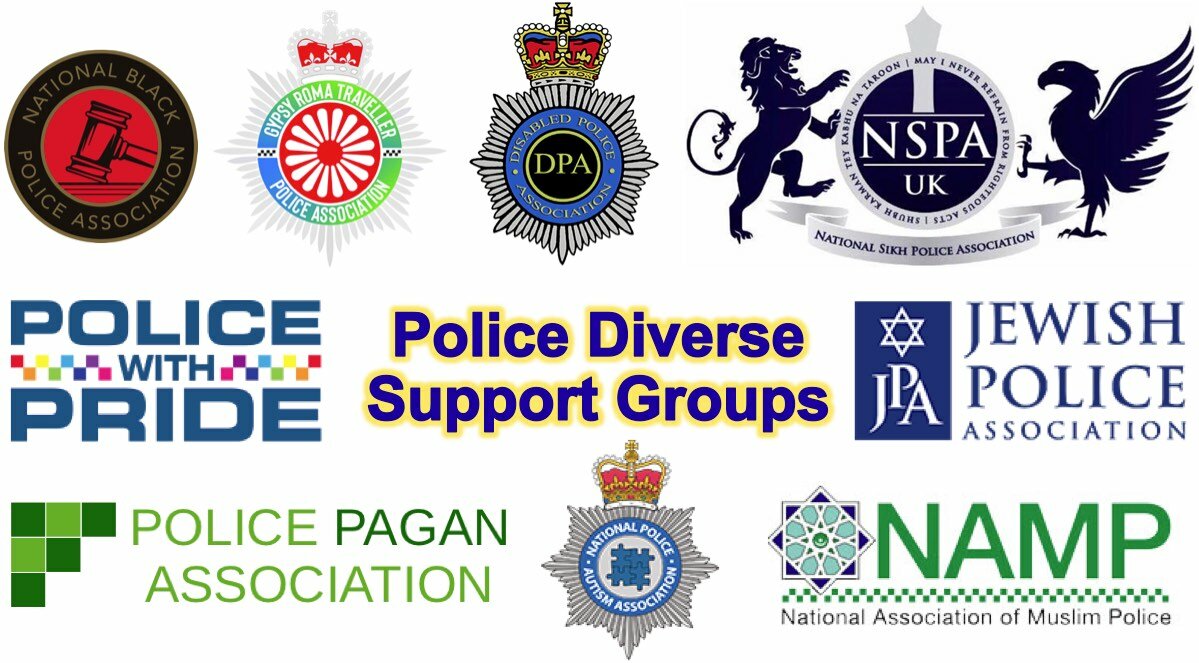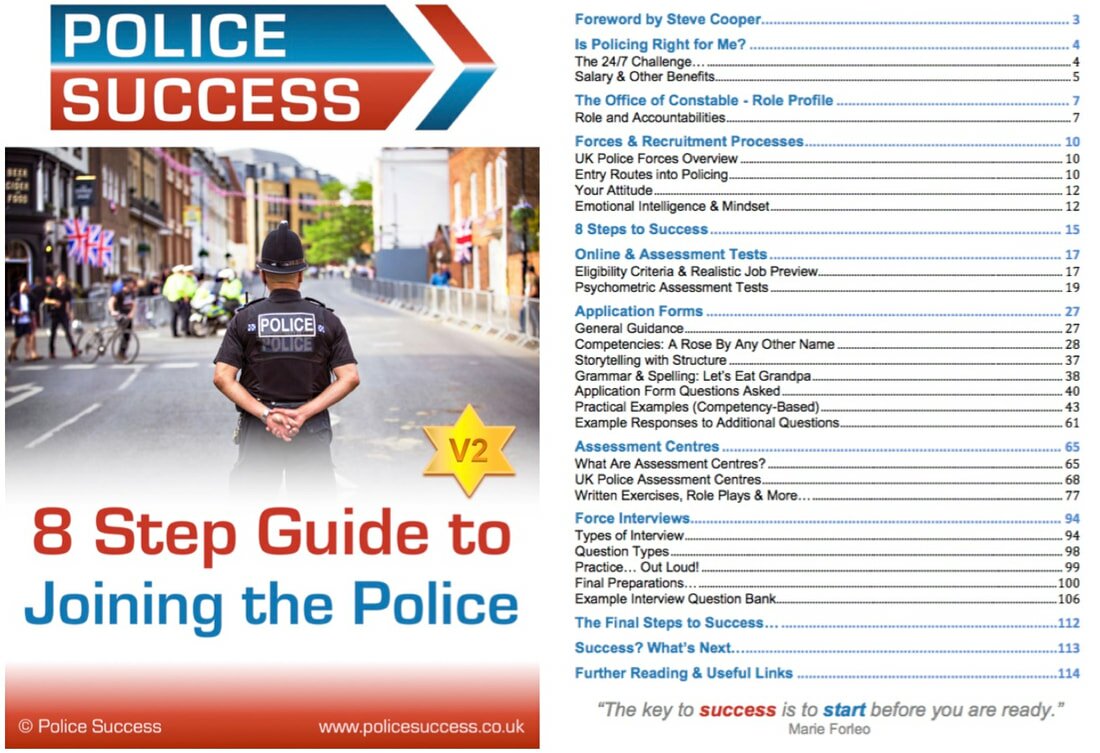Police Officers Support: Part 2 (Diversity Support Associations)
"Everybody can be great, because anybody can serve."
Martin Luther King Jr.
There are diverse range of support organisations in policing for police officers and staff. You will discover more about them once you are successful in joining the police. This blog series provides an overview for those seriously interested in going through the police assessment centres and applying to join their local force, with information most are unaware of until they join.
Part 1 provided insights, history and functions of the Police Federation, the official negotiating body for police officers across England, Wales, Police Scotland and Police Service of Northern Ireland. This blog collates for you the formal associations relating to diversity, specifically in reference to individuals' 'protected characteristics'. Protected characteristics are defined in the Equality Act 2010 and Public Sector Equality Duty; subjects you would do well to become familiar with ahead of your police interview and questions which may arise around your values (a detailed example/practice interview question bank and guidance is provided in our comprehensive Police Success guide!). Diverse Police Associations
"Anything is possible when you have the right people there to support you."
- Misty Copeland
While the Police Federation supports all police officers on a wide range of matters, there are an increasing number of formalised organisations and associations that support police officers aligned to ‘protected characteristics’. These tend to focus on minority or underrepresented groups in the police service and operate both at the national and local level. Their broad aims are generally to provide advice and guidance to officers, promote equality of opportunity, and raise awareness of the issues faced by individuals with specific protected characteristics.
It’s a common misconception and misunderstanding of the Equality Act 2010 that only characteristics in the minority are legally protected. This misunderstanding even occurs within forces’ own 'Equality, Diversity and Inclusion' departments, but that’s maybe a blog for another time! The reality is ALL variations of the nine characteristics are protected, as you will have researched as an excellent police officer candidate. Here is a flavour of the main UK support groups available, normally supporting both police officers and civilian staff. Most forces also have local versions of many of these groups and often go beyond, for example the Met Police have tens of associations including Humanist, Hindu and Greek Associations. British Association for Women in Policing (BAWP)
Founded in 1987, the BAWP is largely a networking and professional development group, helping women in policing progress their careers. Here's the BAWP main site for further information. In 2003, Police Scotland initiated its own ‘Scottish Women’s Development Forum’ with similar aims.
Central & Eastern European Police Association (CEEPA)
This support group is specific to Police Scotland only. It aims to provide support for police officers and staff who originate from Eastern European countries while raising awareness of issues that may also help better connect the police with such communities in the public. See the more info on the CEEPA aims for further details.
Note that although the relevant protected characteristic here is formally called 'race', colloquially in the public sector people more often use the term 'ethnicity', including on official statistics. Interestingly, police diversity statistics on the 'race' (or ethnicity) protected characteristic don't report Eastern European, Gypsy/Traveller or others in the 'White Other' minority ethnic category separately from 'White British', nor in its targets around 'black and minority ethnic' recruitment ambitions. The common comparisons of 'BAME vs. White' clearly leaves room for improvement in policing to truly improve its underrepresentation of minority groups within the 'race' characteristic. Chinese & East Asian Staff Association (CASESA)
This is based in the Met Police and currently operated through a CASESA Twitter account. The aims are similar to other minority ethnic police associations, in the form of providing a support network to individuals, raising awareness of relevant issues affecting people with these characteristics and encouraging equality of opportunity.
Christian Police Association (CPA)
The CPA was founded way back in 1883. It aims to provide a voice and support for Christians in policing, while connecting policing with Christian communities. It initiated the Police Chaplaincy service, which is a service now represented by a diverse range of religions. For further information, here's the national CPA website.
Disabled Police Association (DPA)
The DPA is the national body for disability networks in policing. It aims to support disabled people within the police family and encourage equality of opportunity and fair treatment of those who are disabled, injured or ill. Here's the national DPA website for more info.
While local disability networks have been established across the country for decades, this national association was founded relatively recently in 2012. Scotland Police has a local association which is also geared to supporting carers. Gypsy, Roma & Traveller Police Association (GRTPA)
Founded in 2014, the GRTPA provides a support in the working environment for Gypsy, Roma and Traveller officers and staff. Their slogan is ‘breaking down barriers and building trust’. They also support candidates from these communities and work to help policing understand specific community needs. The GRTPA website provides more details.
Jewish Police Association (JPA)
The JPA provides advice and support to Jewish police personnel while promoting an understanding of the Jewish faith in policing, Like the BAWP, it also provides CPD support through networking and development events. The dedicated national JPA website is here.
National Association of Muslim Police (NAMP)
The NAMP was founded as a national association in 2007, where there were already local force associations in place. Membership is open to all UK police officers and other roles in the police family. NAMP promotes equality, diversity and inclusion. It also leads on initiatives to facilitate better workplace environments for Muslims and delivers training relating to Islamic awareness. Here's the NAMP website for more info.
National Black Police Association (NBPA)
The NBPA was formed within the Met Police in 1994, but now covers the national scene. It aims to improve the working environment of black officers and staff, enhance racial harmony in the police service, encourage equality of opportunity and help progress minority ethnic staff through the ranks with development opportunities.
‘BAME’ is a commonly-used (albeit less than ideal) term to describe Black And Minority Ethnic categories within the ‘Race’ protected characteristic. The NBPA appears to focus more on ‘visible’ minority ethnic groups rather than others who may identify as Gypsy, Roma, Traveller, Eastern European, or others within the ‘White Other’ minority ethnic groups. Here's more on the national NBPA website. Scotland Police also have an equality / diversity national association called ‘SEMPER’ (Supporting Ethnic Minority Police Staff for Equality in Race), to support and represent all minority ethnic employees on issues of equality in race. National LGBT+ Network
This support organisation promotes inclusivity and equality of opportunity for LGBT+ police personnel within the police service, while seeking to ensure policing is representative of communities within these relevant protected characteristics. Here's more on the UK's LGBT+ police network.
Note that Police Scotland have a local ‘LGBTI’ support network and an additional specific National Trans Police Association for supporting those in the police family with any gender identity issue. More on the Police Scotland support networks here. National Police Autism Association (NPAA)
The NPAA is a privately-run group of UK police officers and staff supporting colleagues affected by autism and other neurodivergent conditions such as dyslexia, dyspraxia and ADHD. The NPAA began in 2015 and is open to all UK officers/staff with an interest in autism and neurodiversity. It aims to promote neurodiversity and inclusion within the UK police service. It provides support forums, encourages neurodiverse recruitment/progression, and shares good practice in relation to autism awareness. They welcome all police personnel with a personal, family or professional interest in these conditions. Here's the NPAA website.
National Sikh Police Association (NSPAUK)
The national SPA was established in 2019 to represent Sikh police officers and staff throughout the UK. Their online presence and information/news is currently managed solely through the NSPAUK Twitter account.
Police Pagan Association (PPA)
Established in 2009, the PPA works to tackle issues around Paganism within the police and communities, including raising awareness and tackling faith-based inequalities. Here's the national PPA website for more info.
I hope you found this blog helpful, whether you are an aspiring to join the police as a member of the public, leaving the military, a serving Special Constable or PCSO. Download the comprehensive Police Success guide (below) for more detailed guidance, or feel free to arrange some 1-2-1 coaching for bespoke support. The guide includes comprehensive information about the role, CVF, assessment tests, application interviews, practice questions, and much more to help you excel and achieve your ambition to joining the police!
0 Comments
Your comment will be posted after it is approved.
Leave a Reply. |
 RSS Feed RSS Feed
AuthorA former Royal Marine, Detective Inspector, and is a qualified coach/mentor. With extensive police experience, Steve also established Rank Success to help officers achieve police promotion. CategoriesAll ArchivesFebruary 2021 |





